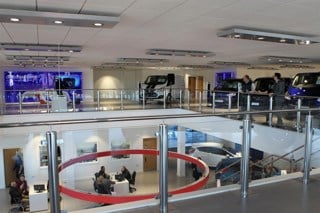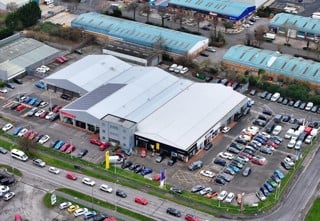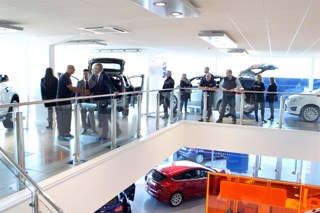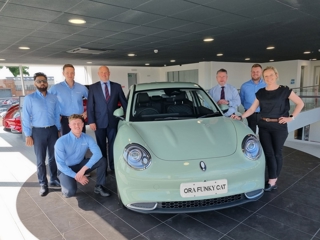[gallery id=1382]
[Editor’s note: As AM went to press, we received news that Sandicliffe managing director Richard Hobbs had been involved in a traffic accident. He is recovering at QMC Nottingham following the incident on April 2. The magazine extends its warmest regards to him and his family and hopes for a swift and full recovery from his injuries.]
Reg Tutt stepped down as managing director at the start of 2017, after 24 years with the East Midlands-based group. His successor is Richard Hobbs, previously the group’s head of retail sales. Hobbs was appointed after a rigorous process that began almost two years ago, when Tutt announced his intention to retire.
[gallery id=1382]
[Editor’s note: As AM went to press, we received news that Sandicliffe managing director Richard Hobbs had been involved in a traffic accident. He is recovering at QMC Nottingham following the incident on April 2. The magazine extends its warmest regards to him and his family and hopes for a swift and full recovery from his injuries.]
Succession can be a serious problem for many privately owned franchised dealer groups, especially in the event of a leadership crisis. However, Sandicliffe Motor Group has shown a smooth transition is possible, providing the process is well planned and communicated.
Reg Tutt stepped down as managing director at the start of 2017, after 24 years with the East Midlands-based group. His successor is Richard Hobbs, previously the group’s head of retail sales. Hobbs was appointed after a rigorous process that began almost two years ago, when Tutt announced his intention to retire.
Sandicliffe hired an external company to conduct management assessments of internal candidates.
“This was to give everybody the chance to throw their hat in the ring, and identify if there were any gaps, so people had time to address those gaps if they really wanted to go for the position,” said Tutt. However, external candidates were also interviewed.
The process led to the promotion of Hobbs, who has been with the company since 2007, when he ran its used car business at Stapleford.
Tutt has stayed on until his retirement this summer in the role of buildings project manager. Following multi-million-pound investments in a four-storey Nissan showroom in Nottingham and a FordStore in Leicester in recent years, Tutt will oversee the completion of Sandicliffe’s final FordStore and Mazda showroom at Nottingham, so that Hobbs can focus on running and growing the group.
“The handover has been planned for all the right reasons. It’s been good to sit alongside Reg to ensure a smooth transition,” said Hobbs.
Tutt said the management team’s relationship with the owning families is paramount. Sandicliffe’s main shareholders are the Woodhouse and Barton families, who do not work in the business, but take a daily interest in how it is performing, alongside their other business concerns in farming, property development, gyms and vehicle contract hire.
“Richard had been here a while, the family like his style, and he stands for the same things and the same values. He’s not ripping up the rule book and changing things unnecessarily, he just has a different way of managing,” said Tutt.
Making the business work harder
However, Hobbs does see opportunities to take the business forward. Although it is profitable, Sandicliffe’s return on sales (RoS) has been below 1% since 2009, and he wants to improve this by focusing more on used cars and aftersales, and continuing to meet new car targets to get those all-important volume bonuses. Its significant commercial vehicle operation, through its Transit centres in Leicester and Nottingham, is also expected to grow.
Hobbs said: “I just want to carry on all the good work that Reg has done over a number of years. We’re in a good place. But we’d like to be in a great place, so three things are on my radar: a degree of discipline, a degree of accountability because for some people it has bypassed them, and we’re working on communication so that everyone is aware of what we’re trying to achieve and is deliverable.”
Tutt said Sandicliffe has been strong in aftersales, but that is reliant on sufficient new car sales. The business has had a strategy to have a 25% market share in the two counties, Nottinghamshire and Leicestershire, in which it trades.
“We think we’re up around the mid-20s now,” said Tutt.
It has had a long partnership with Ford, which remains its largest brand, but in the past 12 years, as Ford’s market share declined (from 14.25% in 2005 to 11.82% in 2016), it has added Kia, Mazda, Nissan and Škoda. It also had flings with Chevrolet, Fiat and Suzuki in the past decade, but each ended after a few years.
The group has room to grow organically, but Hobbs said there will also be “a definite business case to expand” with existing brands, where the open points and the opportunities are right for the group.
However, he said finding those opportunities is not easy. Its last acquisition, of Škoda dealer Farmers, which operated sites in Sandicliffe’s Nottingham and Leicester heartland, was in 2013 when founder Paul Farmer sought to sell up to another family business and retire. Sandicliffe may expand into a third county, as its management team has questioned whether gaining much more than 25% market share locally would lead to the business competing with itself.
Tutt said: “We try to do more than one of each to get scale. We’re not premium, and never have had that outlook in our history, and we have never been at the bottom end of the market either. But it’s good value for money, and there has to be either a reasonable-sized share of the market, or the potential to reach that share.”
Some industry observers have suggested Sandicliffe, rich in freehold property and in family ownership, is ripe for a takeover offer. However, Tutt insisted the owners are in motor retail for the long term.
The company has certainly not stood still. Since AM last visited in 2006, its workforce has grown to 605 and its turnover has doubled. Tutt said 2016 sales totalled about £350 million.
For 2017, the group plans to buy higher volumes of used cars, and to boost stock turn in its different locations. It has appointed two dedicated car buyers with objectives based on price and profile of stock, and it has agreed aggressive targets and incentives with its brands to acquire their stock.
In 2016, it had a record year for Motability buy-back volume, and Hobbs wants to continue that momentum. Auctions are also a source for stock, and the dealer group gets first option on cars defleeted by the separate Sandicliffe Motor Contracts business, one of the top 50 leasing companies in the UK.
Bringing innovation in-house
Hobbs said the business is focused on savings costs and increasing efficiencies, but it is not afraid to try ideas. He’s putting more focus on digital marketing, to move the business away from blanket marketing to a more tailored, targeted approach. The group has also moved away from outsourcing and built its own nine-strong digital marketing team, including website designers, code-writers, search engine optimisation (SEO) experts and apprentices.
“The good thing is that if we need a call-to-action changed, having it in-house we can prioritise and deal with it in a fairly quick timescale,” said Hobbs.
 Attracting these skilled people has not been easy, he said, because they expect a less corporate, more creative environment to work in, and the group has had to accommodate that.
Attracting these skilled people has not been easy, he said, because they expect a less corporate, more creative environment to work in, and the group has had to accommodate that.
It is considering a joint venture with Nottingham College this year, which would recruit suitable young people to train and gain experience at Sandicliffe businesses.
It has a group customer contact centre, with 20 staff based at its Stapleford location, split between aftersales booking and business development roles.
“We try to control leads to the infinite degree and not waste any, so they’re sifted, sorted and handled correctly,” said Tutt.
Tutt said such developments are examples of how the franchised dealer sector has evolved, professionalised even, away from the old perceptions. Dealer groups are now investing in systems, in processes, in measuring and in providing a more consistent experience, and Tutt believes the industry deserves more credit for doing so.
Hobbs said Sandicliffe continually evaluates what skill sets and systems it needs and adapts its teams and structures accordingly.
It takes a similar approach to the services it offers its customers, with a series of innovations and experiments under way to provide them with more convenience. One such experiment was to incorporate cafés into three of its dealerships. Tutt believes they help to distinguish its businesses and create a pleasant environment that encourages customers to wait. Initially, the cafés were sub-contracted out, but they are now being brought within Sandicliffe.
Another experiment has introduced showroom hosts into its Ford sites in Loughborough and Leicester and its Nottingham Nissan outlet. This is to understand the impact they have on customer satisfaction. These ‘meet and greet’ roles are tasked with not leaving any customers waiting. The Leicester site has even included valet parking to ensure customers are not stressed finding a parking space. During certain campaigns, it also offers customers a free breakfast.
A third initiative is Sandicliffe’s trial of a mobile technician, who goes out to the home or workplace of its most premium customers, such as owners of Ford’s Focus RS and Mustang models.
Sandicliffe said the senior technician, despite no experience of sales, has come back from jobs with fantastic feedback and orders for exhaust upgrades and other high-value accessories.
“It’s the instant rapport – he’s a complete petrolhead, and the customers that buy these are the same breed and talk the same language, so it’s a very non-threatening conversation and these customers end up spending decent money on modifications,” said Tutt.
Finally, Sandicliffe has a mobile SMART repair operation, running five vans that visit the local motor trade and are generating good revenues in its second year, said Tutt. Hobbs added: “We realised what we were spending on cosmetic repairs ourselves and looked for a solution. It not only reduced our costs – we’re aiming for 10,000 used car sales this year, so there will be a quantity of repairs required – but also creates a revenue stream.”
Under Tutt, Sandicliffe had no dealership general managers, and instead had group managers, such as Hobbs, who oversaw an individual function, such as sales or parts, across every location. One of Hobbs’s changes has been to appoint general managers (GMs), some via internal promotions, plus an accountant at each site. Doing so ensures they are responsible for everything that happens at their site.
Hobbs said: “Ultimately, I want better performance from each dealership. I’ve had first-hand experience where some people work in silos, without understanding the implications to their colleagues and other departments, and it’s all driven by bottom-line budget expectations, but there’s a bigger picture. I’m happy the GMs will see that bigger picture and make the right commercial decisions at the right time.”
Sandicliffe has always created its own composites as well as management accounts, and Hobbs believes league tables and ‘traffic light reports’ help to show everyone how the business is performing and to foster a sense of friendly competition.
The creation of GM roles has been a transition – staff had been used to reporting into a particular head of function and now have different reporting lines – and Hobbs said managing that transition has been important. It actually began before Hobbs formally took the managing director’s seat, so employees could see that Tutt was also fully behind the plan. Staff were consulted and informed of the change process and timescales and what it meant to each of them personally.
Hobbs said the industry has got into a habit of processing customers – filling out forms and job cards. However, he believes the right people, culture and habits can overcome that. His focus is on ensuring the customer comes first, is given time, and gets a personal, special experience.
“There is no single customer, so one process won’t fit everyone,” he said.
Drilling into the detail
He said the level of customer feedback is a reassurance that most customers are getting the right experience. Should a customer not get the right experience, Hobbs is copied in on any complaints sent into the business.
“Really, the customer wants to know the managing director knows about the problem, but they want it fixed, and we know our contact centre manager and staff will jump on it and fix it quickly,” said Tutt.
A management information system, which Sandicliffe developed in-house, ensures Hobbs and the senior team can see any trends in complaints and drill down into the detail as necessary.
Hobbs said: “We are aiming for a single customer view within our CRM platform. We want an exact timeline, good and bad, in terms of the customer’s experience, loyalty and spend, for servicing, sales, parts and aftersales. That’s a work in progress, being developed internally, and it’s not too far away. I see it as a big priority for this year to see that completed.”
It will link with Sandicliffe’s externally sourced systems, such as a CDK dealer management system (it is upgrading to CDK’s latest Autoline Drive DMS in May), Reef Business Systems showroom solution and Edynamix workshop management software.
Hobbs said having clean data is vital, and added: “We want to measure loyalty and retention, but more importantly to improve how we market to a customer. Marketing needs to be timely, relevant and in the medium the customer is comfortable with. If we throw it out to them, customers will unsubscribe.”
Hobbs believes there is “so much work to do” on how the business gathers and uses data. He wants any business metrics Sandicliffe uses to link into its data. The business is looking at whether to incentivise staff to correctly gather customer data – it already sets a target for gathering email addresses – together with exception reports to ensure managers are aware within 24 hours if something has not been set up correctly.
“It should be a behaviour. I wouldn’t be averse to incentivising or looking at different programmes, but for me it’s our way of working. It should be a standard from induction and onwards and so you are measured on that. It should just be a habit-forming thing that we expect,” said Hobbs.
 Best UK Dealerships To Work For
Best UK Dealerships To Work For
AM is searching for the best dealerships in the UK to work for.
This new programme will recognise and honour the best employers by measuring the views of their employees.
"We look after our people because they are the key to our success."
It’s a phrase often uttered by retail group directors, but which are the best dealerships to work for in the UK?
AM has teamed up with Best Companies Group, that produces similar studies in other industries, to find and recognise the best places to work in the franchised dealer sector.
Enter now.
Login to continue reading
Or register with AM-online to keep up to date with the latest UK automotive retail industry news and insight.





















Login to comment
Comments
No comments have been made yet.